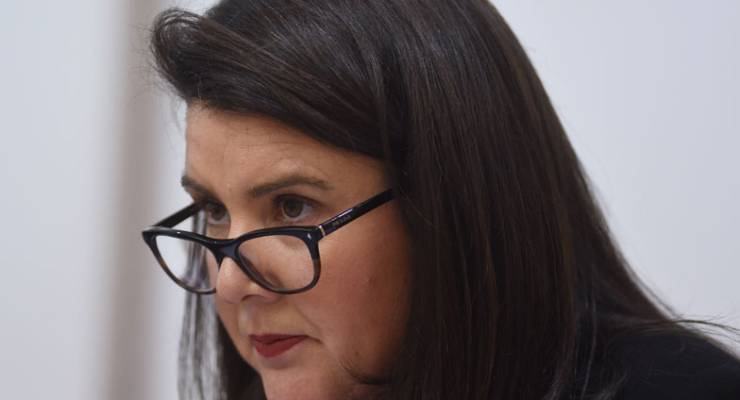
Victims of family and domestic violence will soon be able to use up to $10,000 of their already limited retirement funds to help them flee dangerous situations.
The alternative 10 days’ paid leave is unlikely to be supported by the Coalition.
The amendment to the superannuation law has been in the works since 2018 and was announced yesterday by Minister for Superannuation Jane Hume, one day after thousands of women and allies rallied in Canberra and across the country to denounce the Morrison government’s inaction on sexual violence.
Right now, seriously?
The announcement comes off the back of a report released on Monday which found 36% of women with disability have experienced intimate partner violence and 64% of Australians with disability experience physical, social, intimate partner violence or emotional abuse.
In 92% of cases women physically assaulted by a man know the perpetrator, and in 41% of cases the perpetrator is a former partner. Approximately one in four women has experienced violence by an intimate partner.
In 2018 the federal government allowed five days’ unpaid family and domestic violence leave as a minimum entitlement. It’s a far cry from the 10 days’ paid domestic violence leave bill Labor’s Indigenous Australians spokeswoman Linda Burney introduced in December.
Attorney-General Christian Porter, who is on leave following a historical allegation of historic rape (allegations he strenuously denies), said when the bill was introduced that companies would struggle to cope with the payment following the pandemic. There have been no indications of a change of heart.
The pandemic has also caused an increase in domestic violence due to women being trapped at home during lockdown and others becoming economically dependent on their abuser after the COVID-19 recession.
A 2017 report found women’s retirement savings were 47% lower than their male counterparts on average. According to Counting Dead Women Australia, eight women have been killed due to violence in 2021. In 2020 55 women were killed — more than one a week.
Victim blaming
CEO of Women’s Safety NSW Hayley Foster tells Crikey the superannuation amendment sent a strong victim-blaming message.
“It does send the message that you’ve got yourself into business, you need to be responsible for getting yourself out of it,” she said. “We as a society should be making sure that we’re putting in place the measures to assist people to get out of those unsafe situations.”
The 10 days’ paid leave was important, Foster says, to allow victims to find alternative accommodation and care for their children if their partner is no longer a suitable person to do.
“It could make the difference between them staying or leaving,” she said.
This leave could also be used periodically to attend court hearings and prosecute their perpetrator.
“If a woman can’t turn up to court to put forward her case, it can make the difference between the police prosecution proceeding with that matter or not,” she said.
Support packages need to be pushed
Australian states and territories and developing nations have surpassed the Commonwealth in supporting victims.
The Philippines was the first country to introduce paid domestic violence leave. New South Wales offers five paid days’ domestic violence leave, and Victoria — which Foster says has the best model in Australia — offers $10,000 in flexible support packages to help people escape violence.
These packages make monetary sense, too: a 2016 report estimated violence against women and children costs the Australian economy $22 billion annually. Most of that comes from absenteeism from paid and unpaid work and the inability to perform household tasks and voluntary work.
“This is an absolutely necessary investment that the government should be making,” Foster said.
Employers needed to encourage employees to take leave if necessary.
“In some organisations who have actually put that leave in place it has a low uptake,” she said.
“We would say that that’s an indication that there has not been enough work done to make it a viable opportunity for somebody … Some people would be concerned about confidentiality or retribution that they truly are supported to be able to take that leave.”
If you or someone you know is impacted by sexual assault or violence, call 1800RESPECT on 1800 737 732 or visit 1800RESPECT.org.au.








Hume and Wilson and their mates are at it again! The ideological warfare of this LNP rabble against Superannuation continues unabated – can no one stop them?
It feels like Super is more and more being treated like a back-up bank account than a retirement account.
Maybe they should be entitled to $10,000 of their partner/perpetrators super. That way the Coalition could still erode super and finally score some sort of win for women.
The violence this Federal Govt is doing to Australian society beggars belief ..And it is violence . It’s unadulterated violence on the social body politic..Democracy cannot exist without trust,a social contract that is honored .Voting can become a mere instrument that can destroy democracy, in the hands of rotten governance..These fools of a federal Government are destroying the very foundations upon which they can legitimately stand. Hell, i sincerely hope they are voted out…but the damage already done will not be undone ..The mitigations will take years of restoration..
I’m glad the government has decided that the scourge of family violence in this country is beyond used as yet another excuse to attack the super industry.